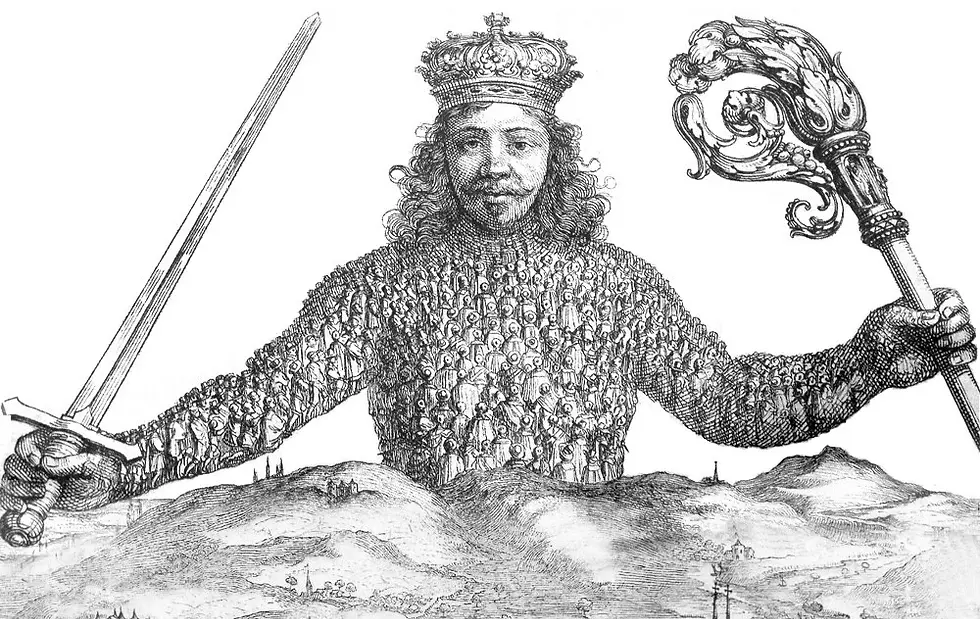From Equality to Emnity: Hobbes and the Conflict Within
- Heta Kariuki
- Jul 13, 2025
- 4 min read
Hobbes’ conception of the state of nature appears antediluvian, echoing the doctrine of original sin in its portrayal of humanity as inherently fallen—“solitary, poor, nasty, and brutish”1—and in need of salvation through the “Mortal God,”2 the Leviathan. Hobbes identifies three sources of conflict stemming from natural equality: competition, diffidence, and the pursuit of glory, all precursors to the “war...of every man against every man.”3 In the interest of brevity, this essay does not seek to defend Hobbes's account of natural equality but rather to highlight key challenges to his theory, prompting critical reflection on its validity.
Defining Natural Equality
For Hobbes, men are naturally equal both intellectually and physically, “in faculties of body and mind.”4 Although one might argue that this overlooks human diversity in ability, Hobbes counters this by broadening his definition of competence, asserting that “the weakest has strength to kill the strongest”5 through “confederacy” or allegiance. Hobbes goes on to state that “others may be more witty...yet they will hardly believe there be many so wise as themselves.”6 While Hobbes recognizes some diversity in ability as conveyed through the superlatives “more” and “weakest,” he contends it is negligible within his concept of natural equality (“men are in that point equal than unequal”).7
Though this appears antithetical to his initial definition of equality, it insightfully suggests that Hobbes does not intend to offer an absolutist definition of natural equality but rather advance a cautionary narrative through it, dissuading the reader from embracing the “vain conceit of one’s own wisdom,”8 and to instead “acknowledge other for his equal by nature”9, thus nullifying a potential suggestion that he contradicts himself within his definition of natural equality.
Competition: Hobbesian Rationality and Irony?
For Hobbes, from an “equality of ability ariseth equality of hope,”10 where a self-conception of hegemony over others leads to competition and, consequently, conflict. He argues that individuals, or “two men,” driven by “desire” for scarce resources, “the same thing...they cannot both enjoy,” inevitably become “enemies.”11 This antagonism, Hobbes contends, extends beyond mere survival into a “perpetual and restless desire for power,” which only “ceaseth in death.”12 This “death” is a result of the mutual and “continual fear”13 that competition plagues mankind with.
Critics may argue that Hobbes is overly rational in his approach. Rousseau, for instance, counters that Hobbes misdiagnoses human nature as belligerent by pointing to “natural sentiments,”14 like Pitié, which “moderate in each individual an activity of self-love,”15 cultivating in us a natural repugnance—akin to that of animals—toward human suffering. This is further supported by the argument that Hobbes oversimplifies the human psyche by stylistically embracing a deductive method of analysis that mirrors the mechanistic, Euclidean view of the world espoused by Galileo. The technique relies on established definitions and postulates to deduce novel truths; thus, in assuming the framework of a scientific treatise, Hobbes’ conception of human nature arguably lends itself to rigidity, being unable to explore nature's metaphysical and subjective dimensions, as Aristotelian scholastics—whom he sought to repudiate—had done.
Furthermore, Hobbes proposes a soteriological solution to the issue of competition, suggesting that subservience to the Leviathan’s “Mortal Lord[ship]”16 provides an escape from the impending ‘war against all.’ Firstly, when individuals enter into a social contract, whereby “the multitude so united in one person is called the commonwealth,”17 they agree to “give up [their] right of governing [themselves] to this man.”18 This results in a unanimous recognition of each other’s equality, thereby neutralizing competition, as the question of “who is a better man?” is rendered irrelevant when “all men are equal.”19 Additionally, by establishing laws that govern behavior, the Leviathan creates property rights, alleviating the fear of property loss that often accompanies competition. Without rights, there would be “no place for industry... no culture of the earth.”20 However, this argument may be criticized for its ironic assumption that the fear of death can be moderated by a Leviathan, whose authority is upheld by fear, “terror.”21 As Hobbes states, “covenants, without the sword, are but words” that cannot “secure a man at all.”22
Conclusion
The Hobbesian nexus between natural equality and competition is scrutinized for its rational oversimplification and underlying pessimism. This invites the question: Can a modus vivendi be reached if Hobbes integrates elements of both scholasticism and empiricism to develop a more holistic understanding of the symbiotic relationship between human motivations—such as competition—and the ideal order of the State?

Citation
1 Thomas Hobbes, T. (1994). Leviathan : with selected variants from the Latin edition of 1688. Indianapolis: Hackett pub. Co. , 76.
2 Hobbes 109
3 Hobbes 76
4 Hobbes 74
5 Ibid
6 Hobbes 75
7 Ibid
8 Ibid
9 Hobbes 97
10 Hobbes 75
11 Ibid
12 Hobbes 58
13 Hobbes 76
14 Gourevitch, V. (n.d.). Rousseau ‘The Discourses’ and other early political writings. Cambridge: Cambridge University Press, 128-131.
15 Rousseau, 169-171.
16 Hobbes 109
17 Hobbes 109
18 Ibid
19 Hobbes 96
20 Hobbes 76-78
21 Hobbes 109
22 Hobbes 106-113



Comments